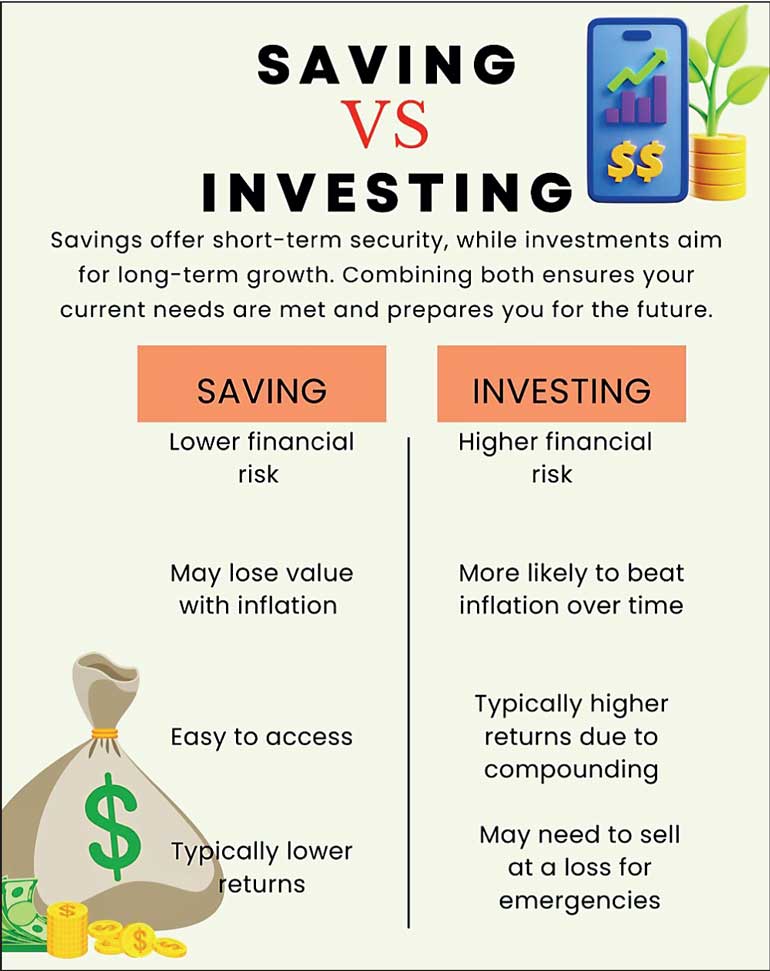Saturday Feb 21, 2026
Saturday Feb 21, 2026
Friday, 19 September 2025 00:04 - - {{hitsCtrl.values.hits}}

For generations, saving has been the foundation of financial planning in Sri Lanka. Fixed deposits, savings accounts, and Government securities have long been trusted as the safest ways to secure one’s future. But in today’s economic reality, saving alone is no longer enough.
With inflation averaging over 30% in recent years, even a 15% return on fixed deposits translates into a negative real return. The money you’ve carefully saved is effectively losing value. When each rupee buys less tomorrow than it does today, preserving capital is not sufficient; you must also focus on growing your capital.
This hard truth has already sparked a shift in behaviour. Over the past five years, the number of Unit Trust investors in Sri Lanka has more than doubled, while assets under management have risen by 172%. Savers are recognising that the old model of relying on passive interest income no longer works.
Both saving and investing are vital pillars of financial planning, but they serve different purposes. Saving is about safety and liquidity, having funds ready for short-term needs. Investing, on the other hand, is about putting money to work for long-term growth. What Sri Lanka needs now is a balanced approach – save for stability, invest for progress.
One of the most accessible ways to begin investing in Sri Lanka is through unit trusts. They provide an attractive middle ground between safety and growth, particularly for first-time investors.
Here’s why unit trusts stand out:
nLow entry point: You can start with as little as Rs. 10,000.
nLiquidity: Unlike real estate or fixed-term deposits, unit trusts allow access to your funds within a few days.
nDiversification: Funds are spread across multiple securities, reducing the impact of any single loss.
nProfessional management: Licensed and regulated professionals make investment decisions using research and market expertise.
nRegulation and protection: The Securities and Exchange Commission of Sri Lanka (SEC) oversees all unit trusts. A trustee monitors daily activities, while a custodian safeguards assets in the name of the trust, separate from the management company.
In short, unit trusts offer accessibility, flexibility, and security, making them an ideal starting point for anyone moving beyond traditional savings.
One of the most significant barriers to investing is fear. Many people hesitate, believing investment is too risky or complex. This is understandable in a culture that values guaranteed returns. But in today’s economic climate, the greater danger is doing nothing at all. Inflation silently erodes savings. By starting small, choosing regulated products, and investing consistently, anyone can become an investor. You don’t need to be wealthy or financially sophisticated, you just need to begin.
The Unit Trust Association of Sri Lanka recommends a five-factor framework to help investors make informed choices:
1.Risk tolerance – how much volatility are you comfortable with?
2.Time horizon – when will you need to access these funds?
3.Past performance – focus on five-year trends, not short-term spikes.
4.Cost structure – understand the fees you will pay.
5.Credibility – review the background and strategy of the management company; always ensure it is regulated by the SEC.
This framework helps investors align their choices with personal financial goals while managing risks effectively.
Sri Lanka is at an inflexion point. The implementation of the 2023 Central Bank Act has brought more stability and predictability to inflation, creating an environment where long-term investing can thrive. The recent boom in the Colombo Stock Exchange is further evidence that Sri Lankans are ready to shift from passive savers to active investors.
At UTASL, we are committed to supporting this transition. Through our national investor awareness campaign and new digital platforms, we are equipping the public with knowledge and tools to make smarter financial decisions.
To every disciplined saver in Sri Lanka: you’ve already done the most challenging part. The next step is to let your money grow. Start small, but start now. Investing isn’t speculation, it is a structured plan to turn your rupees into future wealth. In today’s economy, saving will keep you safe, but investing will help you move forward.